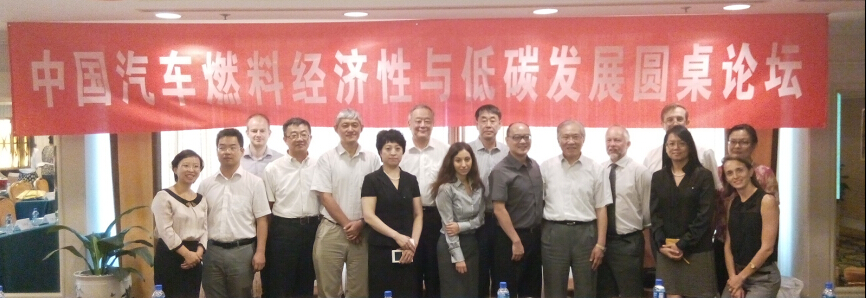|

On August 15 the Innovation Center for Energy and Transportation (iCET) organized the first China Low-Emissions Vehicle and Fuel Economy Stakeholders Engagement Workshop, with the support of the Energy Foundation, the U.K. Government Strategic Prosperity Fund, the United Nations Industrial Development Organization (UNIDO), and the United Nations Environment Programme (UNEP). Over 50 representatives attended, including representatives from China’s Ministry of Industry and Information Technology (MIIT), the National Development and Reform Commission (NDRC), the China Association of Automobile Manufacturers (CAAM), international organizations, and other automobile companies attended to discuss low-carbon automobile issues.
The Innovation Center for Energy and Transportation (iCET), as the only non-government agency involved in the development of China’s passenger car fuel economy standards since 2006, builds its unique passenger car fuel consumption implementation state and trends upon seven years of data collection and market studies to suggest policy recommendations to decision-makers. During this event, iCET director Dr. Feng An released the 2014 China Passenger Vehicle Fuel Consumption Annual Report. He pointed out that the implementation of fuel economy standards and policy is causing fuel efficiency to rise, promoting vehicle technology upgrades and reducing greenhouse gas emissions effectively during the 10-year period of the 11th and 12th five year plans (FYPs). Chinese passenger fuel consumption dropped an average of 2 liters per 100 kilometers, and the Phase IV target during the 13th FYP requires a further drop of about 2 liters to achieve the 2020 target of 5.0L/100km. This is a stricter target than that of the US and EU, making the pressure on importing vehicle companies and large-scale automotive manufacturers particularly large.
Ms. Gloria Veronica Esposito, project director with the U.K. Low Carbon Vehicle Partners (LowCVP), shared the U.K.’s experience in low-carbon vehicle development and policy management. She emphasized that good policy must be supported by facts and data, and that to successfully promote the development of a low-carbon vehicle market the automotive industry, fuel industry, and government agencies must form a multilateral collaboration.
Deputy Director of the National Energy Standardization Committee and former Director of the Industry Planning Division of the National Economic and Trading Commission Bai Rongchun pointed out at the meeting that China’s three challenges to economic development –energy security, environmental conservation, and emissions reduction—were closely linked with the automobile industry. Improving traffic structure, facilitating the development of new energy vehicles, and improving the fuel economy of conventional automobiles should work shoulder-to-shoulder in resolving the current contradiction in the core automotive and economic development paths. He also stated that fuel consumption management must include both punishment and encouragement and that the automobile market should move closer towards the carbon transactions market.
The Deputy Secretary of the China Association of Automobile Manufactureres (CAAM) and former Deputy Director of the Ministry of Industry Department of Industrial Policy Li Wan affirmed and praised iCET’s work at the meeting as “an outstandingly rigorous scientific report.” Fully endorsing the report on the current terrain evaluation and future forecast, he also pointed out that the three key elements of the development of China’s automobile market in manufacturing, marketing, and globalization realized rapid development in the decade, despite recent changes and internal/external difficulties. The future of China’s auto industry, however, still has to go through strong and necessary conditions, and there is a long way to go to enhance the competitiveness of the enterprises’ brand.
Jin Yuefu, Head Engineer of the China Automotive Technology and Research Center (CATARC) and chief architect of China’s automobile fuel consumption standard system, believes that iCET’s report has three important functions: supervisory standards and policy implementation results, the impact of corporate image in the minds of consumers, and the level of government research effectively supplemented. He also pointed out that China’s automobile fuel consumption management has some big problems, such as lack of supervision on imported cars and lack of management methods, and emphasized that a need for management and control of commercial vehicle fuel consumption and pollutant emissions is exceedingly important.
Dr. Jiang Kejun, a researcher at the Energy Research Institute of the National Development and Reform Commission (NDRC), mentioned that in the national top-level design framework for total energy and greenhouse gas emissions control, future transport policy will be determined according to the total number value. In the context of capping, it might take some extreme measures to force the pace of technological innovation.
Ministry Director of the Industry Coordination Division of the Industry Policy Department Zhou Xiaolan indicated that China’s automotive energy management work is continually advancing, including the construction of a standard system, the development of a reporting platform, and marking management measures. Currently, an approach to strengthening vehicle fuel consumption management is being signed, and some energy saving incentives are also being developed.
The European Automobile Manufacturers Association (EAMA), the China Automotive Engineering Research Institute (CAERI), Clean Air Asia – China office, as well as colleagues in the automobile industry also attended to discuss policy management in fuel economy, energy saving, and emissions reductions.
Access the press-release highlighs PPT here.
Workshop Documents Download:
1. Summary
2. Dr Feng AN’s Presentation
3. LowCVP Gloria Esposito’s Presentation
4. 2014 CAFC Report(Chinese)
5. Attendee List(中文、English)
6. Workshop Agenda(中文、English )
|

